
Star Trek II: The Wrath of Khan is a 1982 American science fiction film directed by Nicholas Meyer and based on the television series Star Trek. It is the second film in the Star Trek film series following Star Trek: The Motion Picture (1979), and is a sequel to the original series episode "Space Seed" (1967). The plot features Admiral James T. Kirk and the crew of the starship USS Enterprise facing off against the genetically engineered tyrant Khan Noonien Singh. When Khan escapes from a 15-year exile to exact revenge on Kirk, the crew of the Enterprise must stop him from acquiring a powerful terraforming device named Genesis. The film is the beginning of a three-film story arc that continues with the film Star Trek III: The Search for Spock (1984) and concludes with the film Star Trek IV: The Voyage Home (1986).
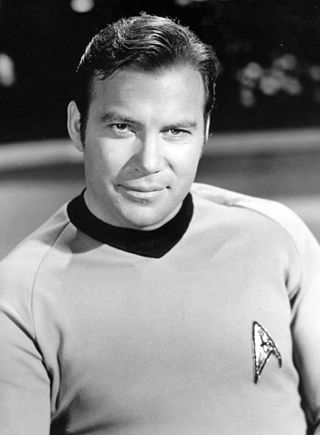
James Tiberius Kirk, commonly known as James T. Kirk or Captain Kirk, is a fictional character in the Star Trek media franchise. Originally played by Canadian actor William Shatner, Kirk first appeared in Star Trek serving aboard the starship USS Enterprise as captain. Kirk leads his crew as they explore new worlds, new civilizations, and "boldly go where no man has gone before". Often, the characters of Spock and Leonard "Bones" McCoy act as his logical and emotional sounding boards, respectively. Kirk has also been portrayed in numerous films, books, comics, webisodes, and video games.

Vulcans, sometimes referred to as Vulcanians, are a fictional extraterrestrial humanoid species in the Star Trek universe and media franchise. In the various Star Trek television series and films, they are noted for their attempt to live by logic and reason with as little interference from emotion as possible. Known for their pronounced eyebrows and pointed ears, they originate from the fictional planet Vulcan. In the Star Trek universe, they were the first extraterrestrial species to make contact with humans.

Leonard Simon Nimoy was an American actor and director, famed for playing Spock in the Star Trek franchise for almost 50 years. This includes originating Spock in the original Star Trek series in 1966, then Star Trek: The Animated Series, the first six Star Trek films, Star Trek: The Next Generation, Star Trek (Film), and Star Trek Into Darkness. Nimoy also directed films, including Star Trek III: The Search for Spock (1984), Star Trek IV: The Voyage Home (1986), and Three Men and a Baby (1987), and appeared in several films, television shows, and voice acted in several video games. Outside of acting, Nimoy was a film director, photographer, author, singer, and songwriter.

Spock is a fictional character in the Star Trek media franchise. He first appeared in the original Star Trek series serving aboard the starship USS Enterprise as science officer and first officer and later as commanding officer of the vessel. Spock's mixed human–Vulcan heritage serves as an important plot element in many of the character's appearances. Along with Captain James T. Kirk and Dr. Leonard "Bones" McCoy, he is one of the three central characters in the original Star Trek series and its films. After retiring from active duty in Starfleet, Spock served as a Federation ambassador, and later became involved in the ill-fated attempt to save Romulus from a supernova, leading him to live out the rest of his life in a parallel universe.

Star Trek IV: The Voyage Home is a 1986 American science fiction film, the fourth installment in the Star Trek film franchise based on the television series Star Trek. The second film directed by Leonard Nimoy, it completes the story arc begun in Star Trek II: The Wrath of Khan (1982), and continued in Star Trek III: The Search for Spock (1984). Intent on returning home to Earth to face trial for their actions in the previous film, the former crew of the USS Enterprise finds the planet in grave danger from an alien probe attempting to contact now-extinct humpback whales. The crew travel to Earth's past to find whales who can answer the probe's call.

Star Trek V: The Final Frontier is a 1989 American science fiction film directed by William Shatner and based on the television series Star Trek created by Gene Roddenberry. It is the fifth installment in the Star Trek film series, and takes place shortly after the events of Star Trek IV: The Voyage Home (1986). Its plot follows the crew of the USS Enterprise-A as they confront renegade Vulcan Sybok, who is searching for God at the center of the galaxy.
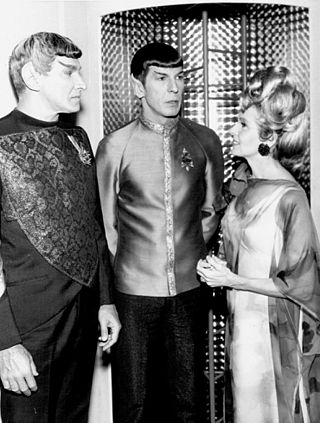
Sarek is a fictional character in the Star Trek media franchise. He is a Vulcan astrophysicist, the Vulcan ambassador to the United Federation of Planets, and father of Spock. The character was originally played by Mark Lenard in the episode "Journey to Babel" in 1967. Lenard later voiced Sarek in the animated series, and appeared in Star Trek films and the series Star Trek: The Next Generation.
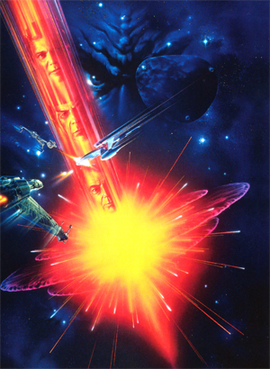
Star Trek VI: The Undiscovered Country is a 1991 American science fiction film directed by Nicholas Meyer, who directed the second Star Trek film, The Wrath of Khan. It is the sixth feature film based on the 1966–1969 Star Trek television series. Taking place after the events of Star Trek V: The Final Frontier, it is the final film featuring the entire main cast of the original television series. The destruction of the Klingon moon Praxis leads the Klingon Empire to pursue peace with their longtime adversary, the Federation; the crew of the Federation starship USS Enterprise must race against unseen conspirators with a militaristic agenda.
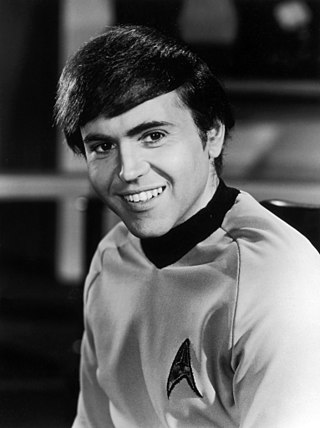
Pavel Andreievich Chekov is a fictional character in the Star Trek universe.
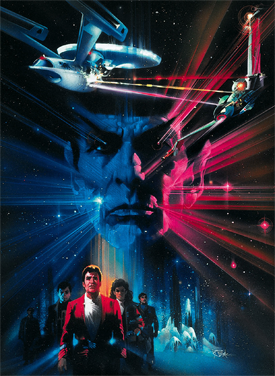
Star Trek III: The Search for Spock is a 1984 American science fiction film, written and produced by Harve Bennett, directed by Leonard Nimoy, and based on the television series Star Trek. It is the third film in the Star Trek franchise and is the second part of a three-film story arc that begins with Star Trek II: The Wrath of Khan (1982) and concludes with Star Trek IV: The Voyage Home (1986). After the death of Spock (Nimoy), the crew of the USS Enterprise return to Earth. When James T. Kirk learns that Spock's spirit, or katra, is held in the mind of Dr. Leonard "Bones" McCoy, Kirk and company steal the decommissioned USS Enterprise to return Spock's body to his homeworld. The crew must also contend with hostile Klingons, led by Kruge, who are bent on stealing the secrets of the powerful terraforming device, Genesis.

Harve Bennett was an American television and film producer and screenwriter.

Star Trek: The Motion Picture is a 1979 American science fiction film directed by Robert Wise and based on the television series Star Trek created by Gene Roddenberry, who also served as its producer. It is the first installment in the Star Trek film series, and stars the cast of the original television series. In the film, set in the 2270s, a mysterious and immensely powerful alien cloud known as V'Ger approaches Earth, destroying everything in its path. Admiral James T. Kirk assumes command of the recently refitted Starship USS Enterprise, to lead it on a mission to save the planet and determine V'Ger's origins.

In the fictional Star Trek universe, the Vulcan nerve pinch is a fictional technique used mainly by Vulcans to render unconsciousness by pinching a pressure point at the base of the victim's neck.

Mark Lenard was an American actor, primarily in television. His most famous role was as Sarek, father of Spock, in the science fiction Star Trek franchise, in both the original and animated series, as well as three films and two episodes of Star Trek: The Next Generation. He also played a Klingon in Star Trek The Motion Picture, and a Romulan in an episode of Star Trek: The Original Series.
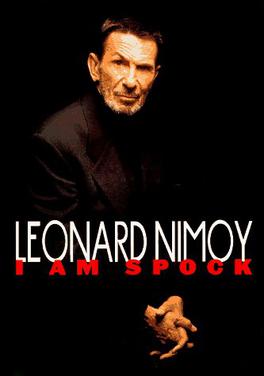
I Am Spock is the second volume of actor and director Leonard Nimoy's autobiography. The book was published in 1995, four years after the release of the last Star Trek motion picture starring the entire original cast, and covers the majority of Nimoy's time with Star Trek in general and Mr. Spock in particular. The book's title was a reference to the first volume of his autobiography, I Am Not Spock, which had been published in 1975. At that time, Nimoy had sought to distance his own personality from that of the character of Spock, although he nonetheless remained proud of his time on the show. Negative fan reaction to the title gave Nimoy the idea for the title of the second volume.
"Requiem for Methuselah" is the nineteenth episode of the third season of the American science fiction television series Star Trek. Written by Jerome Bixby and directed by Murray Golden, it was first broadcast on February 14, 1969.

Merritt R. Butrick was an American actor, known for his roles on the teen sitcom Square Pegs (1982), in two Star Trek feature films, and a variety of other acting roles in the 1980s.

Phil Morris is an American film and television actor. He played Jackie Chiles on Seinfeld, John Jones on The CW series Smallville and voiced Doc Saturday on The Secret Saturdays. He is also the voice of Dr. Joshua Strongbear Sweet in the franchise of Atlantis: The Lost Empire and recently played Silas Stone in Doom Patrol.

The development of Spock, a fictional character first introduced in the American science fiction television series Star Trek, began prior to the start of the series. The first known mention of Spock was in a discussion between Gene Roddenberry and Gary Lockwood, where the latter suggested Leonard Nimoy for the role. Roddenberry agreed with the suggestion, and Nimoy became the first choice actor for the part. However, Roddenberry was required to audition other actors for the role. It was offered to both DeForest Kelley and Martin Landau before Nimoy. Nimoy disliked the prosthetic ears he was required to wear, and there were concerns from the studio that they made him appear satanic. Roddenberry fought to keep the character in the second pilot, "Where No Man Has Gone Before" after the rest of the main cast was dropped from the initial pilot, "The Cage".

















